
Frog
A Novel
کتاب های مرتبط
- اطلاعات
- نقد و بررسی
- دیدگاه کاربران
نقد و بررسی

November 3, 2014
Winner of the 2012 Nobel Prize in Literature, Yan (Red Sorghum) is one of China’s most visible and controversial writers. In his latest novel, he depicts the implementation of China’s national family planning policy and its effect on the inhabitants of a rural village. Through the letters of Wan Zu, aka “Tadpole,” Yan charts the village’s rise from the lean years of the early 1960s, when children ate coal to alleviate hunger, through the boom years of the aughts, with BMWs and Mercedes-Benzes common sights on former mud roads. Midwife Gugu, the aunt of Tadpole and determined Communist Party member, doggedly supports the modern one-child policy and in doing so attracts the wrath of villagers slow to disregard tradition and superstition. When Tadpole’s wife, Wang Renmei, becomes pregnant after illegally removing an IUD, Gugu performs an abortion, during which Renmei dies. Subsequently, Tadpole marries “Little Lion,” Gugu’s assistant at the commune health center. At an advanced age and through unconventional means, Little Lion gives birth to a long-awaited boy, who inspires Tadpole to write a long-planned play—entitled Frog—which concludes the novel and dramatizes the themes of modernization, obstetric policy, and the bonds of family. Goldblatt’s translation is inviting, while Yan’s tale deftly explores the human toll of national policy and historical forces.

November 15, 2014
In a brutally discomfitingly realistic novel that weaves autobiographical details from the author's own life, China's controversial one-child policy comes under the scrutiny of Nobel laureate Mo Yan (Life and Death Are Wearing Me Out, 2008), who reveals the dastardly scope of this edict and the ruthlessness of people who are charged with its implementation. Narrator Xiaopao, an acclaimed playwright nicknamed Tadpole, tells the harrowing story of his aunt Gugu, an ob-gyn in the rural township of Gaomi. A fierce party loyalist, Gugu must enforce the strict population standards of the Family Planning Commission, which include performing late-term abortions, dispensing unwanted birth control, launching manhunts for renegade pregnant women, and destroying homes and villages to punish traitors. When Xiaopao's wife becomes pregnant with their forbidden second child, Gugu's absolute adherence to party policy is carried out with tragic consequences. Heavily laced with ardent social criticism, mystical symbolism, and historical realism, Mo Yan's potent exploration of China's most personal and intrusive social control programs probes the horrors and pain such policies inflict.(Reprinted with permission of Booklist, copyright 2014, American Library Association.)

August 1, 2014
This latest from Chinese writer Mo Yan will attract attention, not only because he is the 2012 recipient of the Nobel prize but because he's been criticized for supporting China's leaders. He's also considered a consummate punch-in-the-gut stylist. Here, a midwife opts to prove her loyalty to the Communist party when her lover defects by vigorously (even gruesomely) enforcing the country's one-child policy.
Copyright 2014 Library Journal, LLC Used with permission.

Starred review from December 1, 2014
Wan Xin, aka Gugu, is a revered obstetrician who has delivered generations of Gaomi Township citizens over the last half century. Yet for every live birth, she's aborted at least as many pregnancies, proving her patriotism by fervently upholding China's one-child policy; even relatives can't escape Gugu's unwavering rampage. Now that she is almost 70, her nephew Tadpole attempts to comprehend her epic career by turning her celebrated, tortured life into theater. Melding tragedy (avoidable deaths, the destruction of families) with absurd outcomes (a fortune-teller who breeds bullfrogs, a panhandling Don Quixote, a television magistrate with a King Solomon complex), Mo again reveals the consequences of blind obedience. His frog analogies suggest that humanity is little more than a population of indistinguishable, spermlike tadpoles with less-than-favorable survival rates. The characters here are not even worthy of proper names, merely called by random body parts, e.g., "Eyes Zhao, Colon Wu, Shoulder Sun"; none is wholly human. VERDICT As Mo's first book in English translation since his 2012 Nobel win (it was originally published in 2009 in China), this should move briskly off the shelves. Readers familiar with the author's work will appreciate his sly references to past titles, including "red sorghum" and Gong Li, while newbies will be inspired to explore more of what they've been missing. [See Prepub Alert, 7/21/14.]--Terry Hong, Smithsonian BookDragon, Washington, DC
Copyright 2014 Library Journal, LLC Used with permission.

December 1, 2014
Wan Xin, aka Gugu, is a revered obstetrician who has delivered generations of Gaomi Township citizens over the last half century. Yet for every live birth, she's aborted at least as many pregnancies, proving her patriotism by fervently upholding China's one-child policy; even relatives can't escape Gugu's unwavering rampage. Now that she is almost 70, her nephew Tadpole attempts to comprehend her epic career by turning her celebrated, tortured life into theater. Melding tragedy (avoidable deaths, the destruction of families) with absurd outcomes (a fortune-teller who breeds bullfrogs, a panhandling Don Quixote, a television magistrate with a King Solomon complex), Mo again reveals the consequences of blind obedience. His frog analogies suggest that humanity is little more than a population of indistinguishable, spermlike tadpoles with less-than-favorable survival rates. The characters here are not even worthy of proper names, merely called by random body parts, e.g., "Eyes Zhao, Colon Wu, Shoulder Sun"; none is wholly human. VERDICT As Mo's first book in English translation since his 2012 Nobel win (it was originally published in 2009 in China), this should move briskly off the shelves. Readers familiar with the author's work will appreciate his sly references to past titles, including "red sorghum" and Gong Li, while newbies will be inspired to explore more of what they've been missing. [See Prepub Alert, 7/21/14.]--Terry Hong, Smithsonian BookDragon, Washington, DC
Copyright 2014 Library Journal, LLC Used with permission.

























دیدگاه کاربران